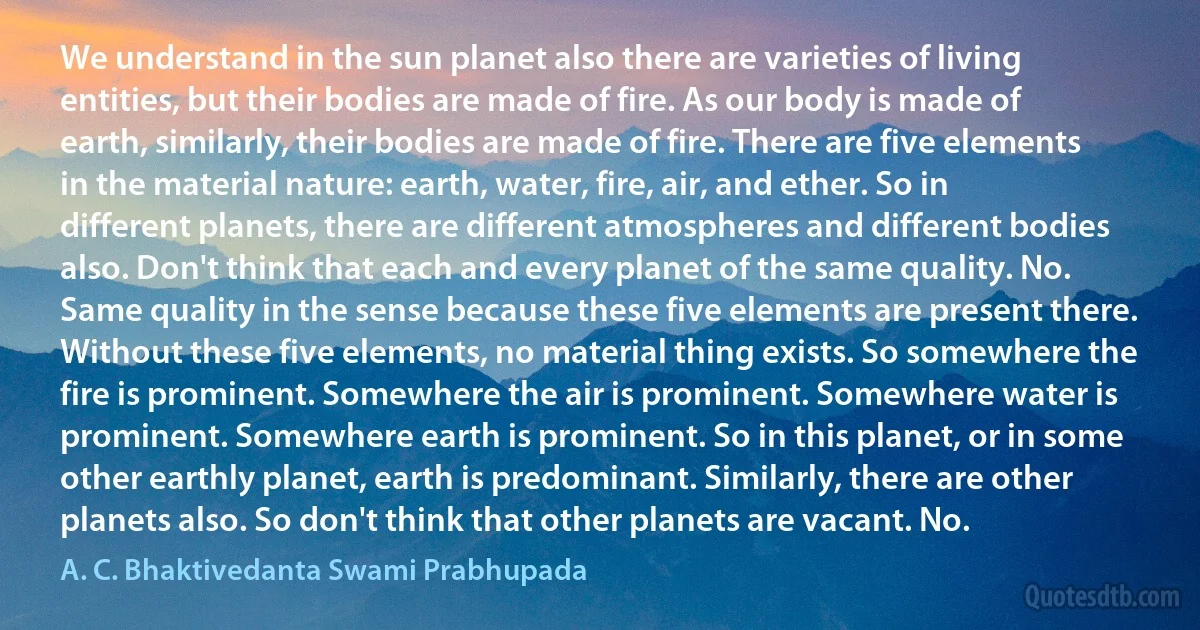
We understand in the sun planet also there are varieties of living entities, but their bodies are made of fire. As our body is made of earth, similarly, their bodies are made of fire. There are five elements in the material nature: earth, water, fire, air, and ether. So in different planets, there are different atmospheres and different bodies also. Don't think that each and every planet of the same quality. No. Same quality in the sense because these five elements are present there. Without these five elements, no material thing exists. So somewhere the fire is prominent. Somewhere the air is prominent. Somewhere water is prominent. Somewhere earth is prominent. So in this planet, or in some other earthly planet, earth is predominant. Similarly, there are other planets also. So don't think that other planets are vacant. No.
A. C. Bhaktivedanta Swami PrabhupadaRelated topics
air body different earth ether fire five living nature predominant present quality sense somewhere sun thing think waterRelated quotes
In its most general form and from the point of view of physics, love is the internal, affectively apprehended, aspect of the affinity which links and draws together the elements of the world, centre to centre. This is how it has been understood by the great philosophers from Plato, the poet, to Nicolas of Cusa and other representatives of frigid scholasticism. Once this definition has been accepted, it gives rise to a series of important consequences. Love is power of producing inter-centric relationship. It is present, therefore (at least in a rudimentary state), in all the natural centres, living and pre-living, which make up the world; and it represents, too, the most profound, most direct, and most creative form of inter-action that it is possible to conceive between those centres. Love, in fact, is the expression and the agent of universal synthesis.

Pierre Teilhard de Chardin
Although "jumping to conclusions" is an expression, rather than an activity, it is as dangerous as jumping off a cliff, jumping in front of a moving train, and jumping for joy. If you jump off a cliff, you have a very good chance of experiencing a painful landing unless there is something below you to cushion your fall, such as a body of water or an immense pile of tissue paper. If you jump in front of a moving train, you have a very good chance of experiencing a painful voyage unless you are wearing some sort of train-proof suit. And if you jump for joy, you have a very good chance of experiencing a painful bump on the head, unless you make sure you are standing someplace with very high ceilings, which joyous people rarely do. Clearly, the solution to anything involving jumping is either to make sure you are jumping to a safe place, or not to jump at all. - Lemony Snicket.

Daniel Handler
With mankind the differences between the sexes are greater than in most species of Quadrumana, but not so great as in some, for instance, the mandrill. Man on an average is considerably taller, heavier, and stronger than woman, with squarer shoulders and more plainly-pronounced muscles. ... Man is more courageous, pugnacious, and energetic than woman, and has a more inventive genius. His brain is absolutely larger, but whether relatively to the larger size of his body, in comparison with that of woman, has not, I believe been fully ascertained. In woman the face is rounder; the jaws and the base of the skull smaller; the outlines of her body rounder, in parts more prominent; and her pelvis is broader than in man; but this latter character may perhaps be considered rather as a primary than a secondary sexual character. She comes to maturity at an earlier age than man.

Charles Darwin
It's offense you maybe can't live with because it opens up a crack inside your thinking, and if you look down into it you see there are evil things down there, and they have little yellow eyes that don't blink, and there's a stink down there in that dark and after a while you think maybe there's a whole other universe where a square moon rises in the sky, and the stars laugh in cold voices, and some of the triangles have four sides, and some have five, and some have five raised to the fifth power of sides. In this universe there might grow roses which sing. Everything leads to everything, he would have told them if he could. Go to your church and listen to your stories about Jesus walking on the water, but if I saw a guy doing that I'd scream and scream and scream. Because it wouldn't look like a miracle to me. It would look like an offense.

Stephen King
...yet we are told that this great nation, with such a record of splendid achievements in the past and in the present, is unfit to make its own laws, is unfit to control its own finance, and that it is to be placed as if it were a nation of children or lunatics, under the tutelage and guardianship of some other body-and what body? Who are the guardians of this mighty people? Who are they? With all respect, I shall have to make exceptions; but I am speaking of them as a whole. ... They are men who have neither the training, the qualifications, nor the experience which would fit them for such a gigantic task. They are men whose sole qualification-speaking in the main, and for the majority of them-they are simply men whose sole qualification is that they are the first born of persons who had just as little qualification as themselves.

David Lloyd George
